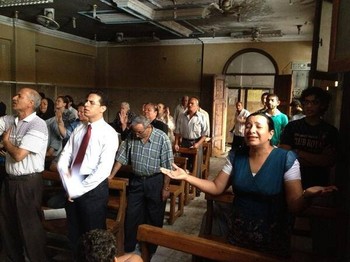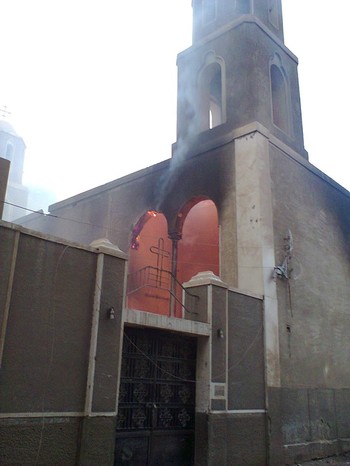They were laughing. They were planning their future ministries ahead. These Presbyterian pastors were slapping hands in their famous “I’m giving you a hard time” kind of Middle Eastern handshake among male friends.
And, they were deeply, deeply anxious.
The city of Cairo, their nation’s capitol, was in chaos. The two major encampments of Muslim Brotherhood, supporters of former President Mohammed Morsi, were being quickly cleared out by the police and army. The crowds had been warned for days to leave.
Their presence had brought the thousands and thousands who live and work around them to a standstill of sleeplessness and intimidation. Businesses had all closed. The noise and human waste had also made these places untenable for everyone to live.
They had shouted for Morsi's reinstatement and the “downfall” of Al-Sisi, the general over all the armed forces of Egypt. Ironically, this is the one general whom Morsi himself had chosen to head up the military after he had suddenly dismissed all the other senior military officers. Calling for jihad, holy war, had whipped the crowds into a frenzy of hatred for all opposed to them.
As a political rally, going on for weeks, their resolve was great. They had been heard. But they were not interested in any other form of communication or compromise. Numerous invitations by the interim government, world leaders and the Grand Imam of Cairo himself to enter into constructive dialogue had all been rejected.
The protesters’ shouting, the buildup of weapons and barricades in their encampments, and their increased acts of violence frightened the citizens of Cairo who called for government to do something.
When the security forces finally cleared the encampments, photos of weapons and barricades were released that clearly contradicted earlier reports by Western media that these were peaceful protestors.
Members of the groups involved in the protests immediately went on to burn numerous churches, destroy police stations, ransack Bible stores and even mutilate the bodies of their own Egyptian police and military they had killed.

Members of Mallaway Presbyterian Church in Egypt held worship in their partially burned church days after it was set on fire by Islamist radicals. —Special to Presbyterian News Service
It is not yet clear if these attacks against Christian and government buildings were planned by Islamists before the government’s intervention.
Sadness, yes, is all around. Hope for democracy remains. It will take so much more work, dialogue and compromise than flag waving, mind-numbing slogan shouting, marches and acts of horrific violence.
These declare an aspiration, sometimes rightly said and sometimes filled with deception, but these demonstrations will not bring democracy. Not even the peaceful demonstrations of June 30th in Tahrir Square will themselves usher in a democratic government.
People from various segments of Egyptian society believe the next “revolution” will come from those who are magnanimous and truly seeking goodwill for all. One exhausted government official said, “The next, and greatest revolution, will come from those who seek and honor peace. It will have Muslim and Christian names on it. It will be a covenant of citizenship where OUR vision trumps my vision. It will come with less concern for who has the power and more from those who truly want to help a nation of poor, powerless people.”
A young Muslim of the conservative Noor Party painted a similar picture for peace in Egypt: “It will come from those who truly read their Holy Qur’an and Holy Bible, the peacemakers, who find in their scriptures the highest aspirations of humanity. They can aspire to be guided by a merciful God. The message is there.”
That revolution will succeed and last. History proves it.
Only then will Egypt move forward in peace and prosperity, a democratic nation, where people laugh, plan their future and share in the handshake of unity.
That will be a truly great revolution, indeed.
For security reasons, the name of the writer of this article has been withheld.

